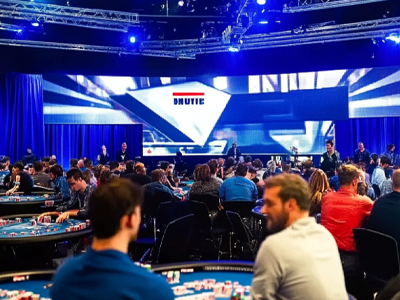The WSOP’s ‘LaptopGate’ incident is bringing changes to tournament play
The European Poker Tour (EPT) has implemented a new policy banning the use of solvers at live events, a move that signals a strong stance against the use of technology that could give players an unfair advantage. This change, which comes into effect during the ongoing event in Barcelona, is a direct response to concerns raised within the poker community about the use of such tools during tournaments.
Solvers, which are software programs designed to calculate game theory optimal (GTO) strategies, have become increasingly popular among poker players looking to enhance their gameplay. However, their use in live tournaments has sparked controversy, particularly after incidents where players were seen consulting solver outputs during crucial moments in games. This has led to questions about the fairness and integrity of live poker events.
Changes regarding some rules and procedures that will come into play @PokerStarsLIVE EPT Barcelona.
Shotclocks: Time will be reduced on first action in the hand to 15 seconds instead of 30. Timebanks will still be worth 30 seconds each.
We were considering removing all…
— Kenny Hallaert (@SpaceyFCB) August 26, 2024
To address these concerns, the EPT has now banned the use of any device containing solver software within the entire tournament area. This prohibition applies not only to players but also to spectators, ensuring that no one in the room of the event can access or use solver tools. The rule specifically states that players are not allowed to use GTO solver software, GTO charts, or any artificial intelligence tools that could provide a competitive edge at any time during the tournament.
The decision to enforce this ban follows the widely discussed incident during the recent WSOP Main Event, where high-profile players were spotted using a laptop on the rail to provide strategic advice to a competitor. This event, often referred to as “LaptopGate,” highlighted the potential for technology to influence the outcome of live tournaments in ways that many consider unethical.
Kenny Hallaert, the Tournament Director, has been vocal about the need for these changes. In addition to the ban on solvers, Hallaert also announced other updates aimed at maintaining the integrity of the game, such as the introduction of a shorter shot clock and adjustments to how cards are dealt to prevent them from being exposed.
The EPT’s move to ban solvers has been met with mixed reactions. While some players support the decision as a necessary step to preserve the fairness of the game, others, like poker pro Dominik Nitsche, have raised concerns about the feasibility of enforcing such rules. Nitsche pointed out that any smartphone could theoretically access solver information, making it challenging to regulate.
Despite these challenges, the EPT’s new policy is expected to set a precedent for other major poker tournaments, including the World Series of Poker (WSOP). With the increased scrutiny on the use of technology in poker, it’s likely that similar rules will soon be adopted across the broader poker landscape, reinforcing the importance of fair play in the sport.

